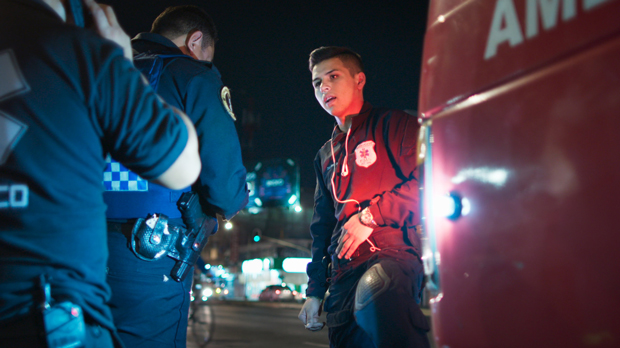 Midnight Family (2019) 1091 Media/Documentary RT: 81 minutes No MPAA rating (thematic elements, language, images of injuries) Director: Luke Lorentzen Screenplay: Luke Lorentzen Music: Leonardo Heiblum, Jacobo Lieberman, Alexis Ruiz and Andres Sanchez Cinematography: Luke Lorentzen Release date: January 10, 2020 (Philadelphia, PA) Cast: Fer Ochoa, Juan Ochoa, Josue Ochoa. Spoken in Spanish w/English subtitles
Midnight Family (2019) 1091 Media/Documentary RT: 81 minutes No MPAA rating (thematic elements, language, images of injuries) Director: Luke Lorentzen Screenplay: Luke Lorentzen Music: Leonardo Heiblum, Jacobo Lieberman, Alexis Ruiz and Andres Sanchez Cinematography: Luke Lorentzen Release date: January 10, 2020 (Philadelphia, PA) Cast: Fer Ochoa, Juan Ochoa, Josue Ochoa. Spoken in Spanish w/English subtitles
Rating: **
I’ve decided to take a cue from Pauline Kael, the outspoken New Yorker film critic and subject of a recent documentary, in my review of Midnight Family. I’m going to come right out and say exactly what I think of it. I didn’t like it. Even though it’s about a subject of interest, it failed to engage me. For the record, Luke Lorentzen’s documentary centers on a family that operates a private ambulance in Mexico City. The Ochoas drive around at night looking for patients to take to area hospitals, a service for which they expect to be paid on the spot. Given that the government provides only 45 ambulances in a city with nine million people, privately owned ambulances are big business. Whenever a call for help comes over the radio, they race each other on the streets Fast & Furious-style in order to be the first on the scene.
If the American health care system needs fixing, we at least have it better than our neighbors across the border. In Mexico, it’s just about broken beyond repair. When somebody needs emergency care, they have to wait awhile for help to show up. When a private ambulance finally shows up, the cops on the scene demand bribes before they allow the EMTs to render aid and transport the patient. They check if all the paperwork and licenses are in order. They insist they must wait a mandatory 30 minutes to see if a government ambulance shows up before the patient can be moved. They threaten the EMTs with arrest if they resist. Of course, it all stops once money changes hands.
The problems don’t stop there. Mexico City is what you call economically depressed. Most of the Ochoas’ patients can’t or won’t pay. They have no money. A lot of times, there’s no space at the one hospital that takes charity cases meaning that they have to take them to a private hospital that the patient or his/her family can’t afford. Then once they’ve dropped off the patient, that’s when they learn they’re being stiffed yet again. At best, the Ochoas eke out a meager living.
While all of these are valid points, Midnight Family keeps repeating them. It’s a rather redundant movie. It also gives us a lot of uninteresting scenes of family drama like father Fer’s depressed state, older son Juan worrying about their finances and riding little brother Josue about attending school. We also get scenes of Juan describing their cases to his girlfriend over his phone. The film is unclear on how it feels about the Ochoas. Are they good people or profiteers taking advantage of a broken system and people at their most vulnerable? Certainly there are many non-altruistic folks among the ranks. Lorentzen gets the tone all wrong too. A movie about ambulance drivers racing against the clock to get their patients to the hospital in the nick of time should have a sense of urgency to it. Although I didn’t much care for it, Martin Scorsese’s Bringing Out the Dead got it right. It’s a jittery, over-caffeinated piece that puts the viewer right in the passenger seat. It does, however, get right the look and feel of a big city after dark. I’ll give it that much.
Even at a scant 81 minutes, Midnight Family feels stretched out. It would work better as a documentary short subject. Now here’s how I would have done it. I’d open with a brief into to the Ochoa family via expository conversation. After a few minutes, a call comes over the radio about a person injured in a four-story fall from an apartment building (one of the cases in the movie). The Ochoas race to the scene trying to maneuver ahead of other private ambulances. They make it to the scene first where Fer treats the patient while Juan deals with the corrupt cop. At one point, they cuff him and throw him in the back of their car until he agrees to pay them off. They finally get on their way only to find that there’s no space available at the public hospital. They can’t even get into the parking lot. They manage to get the patient’s family to agree to a private hospital. When they finally arrive, the patient is DOA. Juan goes over to the family and offers up a few words of condolences before telling them they need to settle their bill right now. Of course, they can’t pay. They argue a bit before Juan walks off in defeat. Outside, Fer and Josue are cleaning and organizing the ambulance. The family gets in and drives off with the radio alerting them to another person in need of medical care. The end credits roll as they drive down the nighttime road. Normally, I’m not one to tell a filmmaker how to do his/her job. In this case, I’ll make an exception as I see a potentially exceptional short film.
I wouldn’t characterize Midnight Family as a bad movie; it’s merely an unsatisfying one. It leaves a lot to be desired. As I indicated in the previous paragraph, there’s a great movie to be made on this subject. Brevity would certainly get the point across more efficiently and effectively. But that’s just my opinion. Well, it’s my job, isn’t it?




